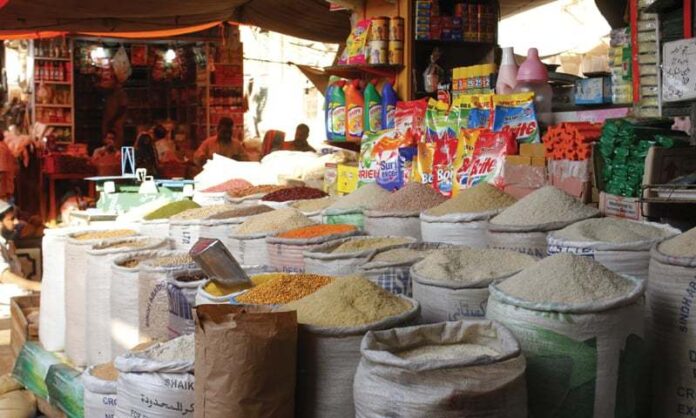- CCP asked to keep a vigilant check on undue profiteering, cartelization and monopolistic practices
- Punjab govt directed to share its online market complaints app with ICT and other provinces
ISLAMABAD: The National Price Monitoring Committee (NPMC) meeting was held on Friday to discuss the recent hike in prices of essential food and non-food items and to take stock of the supply of essential items.
The meeting, chaired by the finance special secretary, was attended by the representatives from Punjab, Sindh, Khyber Pakhtunkhwa, Islamabad Capital Territory, Competition Commission of Pakistan, Pakistan Bureau of Statistics, Utility Stores Corporation and the Federal Board of Revenue.
The meeting was informed that the National Consumer Price Index (CPI), with a new base for the month of August 2019, had increased by 10.49pc as compared to the corresponding month of last year. The urban CPI was recorded at 10.64pc, while rural CPI stood at 10.27pc.
It was informed that the Sensitive Price Indicator (SPI), which monitors the prices of 53 essential items on a weekly basis, recorded a decrease of 0.18pc as on 29th August 2019. Prices of 16 items increased, 12 items decreased while that of 25 items remained unchanged.
The NPMC discussed in detail the increase in prices of daily food items and non-food items including wheat, rice, chicken, onions, pulses (mash, gram, masoor), meat, milk powder, cooking oil, vegetable ghee, sugar, gas, motor fuel, transport services, footwear, construction wages, doctor’s fee etc.
The committee dilated upon measures that could control anti-competitive practices, undue price hike and price disparity.
It was noted that inflationary pressures were affecting the purchasing power of the lower-middle-class of Pakistan. Therefore, vigilant monitoring of food and non-food items at district levels and better coordination among the provinces were essential to ensure the provision of essential food items at affordable prices.
The meeting also took note of the profit margin at the wholesale and retail level. It advised the provincial governments to take proactive measures to rationalize the undue profit margins.
The Competition Commission of Pakistan was also advised to keep a check on undue profiteering, cartelization and monopolistic practices so that the small enterprises may be encouraged to enhance their productivity.
The meeting stressed the effective utilization of statistical data for planning and decision making to mitigate the inflationary pressures and to remove price disparity in ICT and among provinces.
The ICT administration was directed to take strict measures to ensure the applicability of price list across the federal area, besides ensuring the quality of essential items in the market.
The meeting further reviewed the prices of essential items in Sasta bazaars and open markets, noting that the prices were significantly lower in Sasta bazaars as compared to open markets. However, the need was felt to expand the Sasta/Itwar bazaars across the country.
The chair suggested that the provincial governments and ICT expand the network of such bazaars. He also advised the officials ensure the quality of essential items in such bazaars.
“While discussing the price control mechanisms, supply side factors should also be taken into consideration, as unless the availability of sufficient commodities is not ensured, prices may continue to fluctuate in the markets,” he remarked.
NPMC directed the Ministry of National Food Security & Research to constitute a committee to review the framework of recommendations prepared by CCP regarding price control and supply of essential food items.
The Punjab government was also directed to share its online market complaints app, along with its redressal mechanism, with ICT and other provinces.
The NPMC chairman assured that the Finance Division was committed to taking effective fiscal measures to control inflationary pressures and to provide relief to the general public at large.




